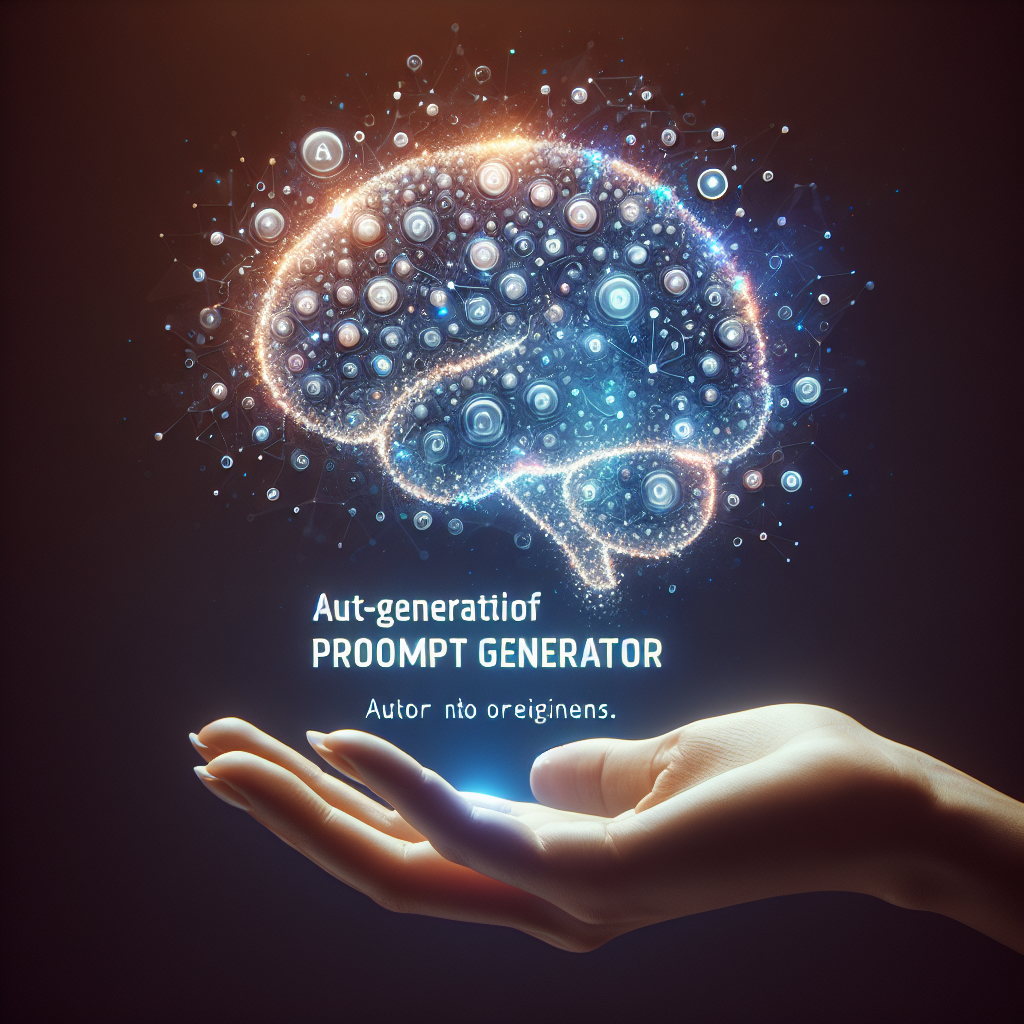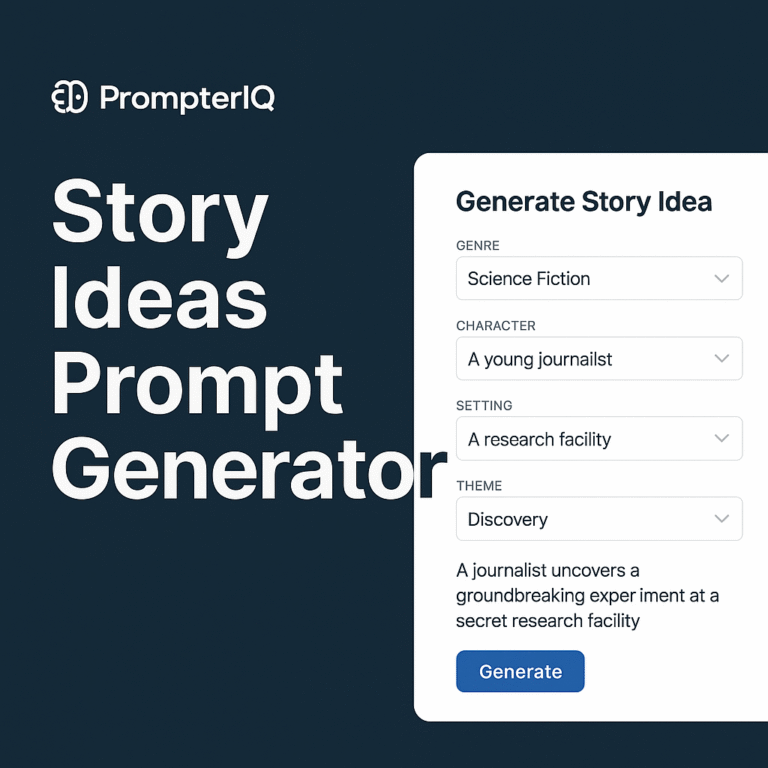AI Prompt Generator: Insights and Applications
The fascinating world of AI has introduced numerous tools and innovations, one of which is the AI prompt generator. Have you ever wondered how these tools can transform your creative process? Imagine having a personal assistant that not only understands your needs but also anticipates your next move. AI prompt generators offer precisely this opportunity, revolutionizing how we approach tasks from writing to problem-solving. But what exactly are these tools, and how can they benefit you? In this article, we will delve into the mechanics of AI prompt generators, explore their applications, and discuss how they can enhance your productivity and creativity.
Understanding AI prompt Generators

AI prompt generators are sophisticated tools that use artificial intelligence to generate text or ideas based on the input provided by the user. These tools are typically driven by advanced machine learning models, such as GPT-3, which have been trained on vast datasets to understand and mimic human language patterns. These generators are not limited to a single language or style. They can adapt to various linguistic nuances and cultural contexts, making them versatile across different industries and fields.
The Technology Behind AI Prompt Generators
At the core of an AI prompt generator is a machine learning model designed to predict the next word or phrase in a sequence. These models, often based on neural networks, are trained using large datasets comprising diverse writing styles and genres. The more extensive and varied the training data, the more versatile the model becomes. For instance, the GPT-3 model by OpenAI, a popular choice for many AI prompt generators, is trained using a dataset that includes books, articles, and websites, allowing it to understand and generate text across various contexts. This capability enables AI prompt generators to produce coherent and contextually relevant output that mimics human-like writing. The ability to fine-tune these models further allows developers to tailor the AI to specific tasks or industries, enhancing its utility and applicability.
How AI prompt Generators Work
AI prompt generators function by receiving an initial input or ‘prompt’ from the user. This prompt can be a word, sentence, or even a paragraph. The AI then processes this input to generate a continuation or expansion based on learned patterns and context. Here’s a step-by-step breakdown of how these generators typically operate:
- The user provides an initial prompt: This could be a few words or a more detailed sentence, setting the stage for the AI’s task.
- The AI processes the prompt: Using its trained model, the AI analyzes the input to determine potential continuations. It evaluates different possibilities to ensure the response aligns with the desired tone and style.
- Text generation: The AI generates text that it predicts would naturally follow the given prompt, ensuring coherence and relevance. The algorithm considers factors like context, user intent, and linguistic structure to produce meaningful content.
To enhance user experience, many AI prompt generators offer customization options, allowing users to set parameters such as tone, style, and length of the output. This flexibility is crucial for users looking to maintain consistency in their voice across different platforms or projects.
Applications of AI Prompt Generators
The versatility of AI prompt generators makes them suitable for a wide range of applications. From creative writing to professional content creation, these tools offer invaluable support in various domains.
Creative Writing and Storytelling
For writers, AI prompt generators can serve as a source of inspiration and creativity. Whether you’re drafting a novel, crafting a poem, or developing scripts, these tools can provide fresh ideas and help overcome writer’s block.
- Generating plot ideas: AI prompt generators can suggest unique plot twists or character developments, sparking new directions in a storyline that authors may not have considered.
- Enhancing dialogue: Writers can use AI to generate realistic and engaging dialogues between characters. This functionality is particularly useful for scriptwriters looking to create natural-sounding conversations.
- Creating immersive worlds: By providing detailed descriptions and settings, AI can help build vivid, immersive worlds for stories. This is especially beneficial for genres like fantasy and science fiction, where world-building is crucial.
Content Creation for Blogs and Articles

In the realm of digital content, AI prompt generators can assist bloggers and content creators by streamlining the writing process. These tools can offer topic ideas, create outlines, and even draft sections of articles.
- Topic generation: AI can suggest trending topics or angles for blog posts, helping creators stay relevant and engaging to their audience.
- Outline creation: By providing a structured outline, AI helps organize thoughts and ideas efficiently, ensuring a logical flow in the final piece.
- Draft writing: AI-generated drafts can serve as a foundation that writers can refine and polish, significantly reducing the time spent on initial drafts.
Business and Marketing Applications
AI prompt generators are also beneficial in business and marketing contexts, where they can assist in crafting compelling copy for advertisements, social media posts, and marketing campaigns.
- Ad copy generation: AI can generate catchy and persuasive headlines and body text for advertisements, maximizing appeal and conversion rates.
- Social media content: AI can help create engaging posts that resonate with target audiences, boosting interaction and brand visibility.
- Email marketing: Personalized and effective email content can be generated using AI prompts, enhancing open and click-through rates.
Benefits and Limitations of AI Prompt Generators
While AI prompt generators offer numerous benefits, it’s essential to understand their limitations to use them effectively.
Benefits
- Increased productivity: AI prompt generators can significantly speed up the writing process, allowing users to focus on refining content rather than starting from scratch. This efficiency is particularly beneficial in fast-paced environments where time is a critical resource.
- Enhanced creativity: By providing new perspectives and ideas, AI helps unlock creative potential, enabling users to explore concepts they might not have considered otherwise.
- Cost-effectiveness: AI tools can reduce the need for extensive research or brainstorming sessions, saving time and resources, which is especially crucial for startups and small businesses.
Limitations
- Lack of human touch: AI-generated content may lack the emotional depth and nuance of human writing, which can be a drawback in contexts requiring a personal or empathetic tone.
- Dependency on quality input: The output quality heavily depends on the initial prompt provided by the user. Poorly structured prompts can lead to irrelevant or unsatisfactory results.
- Potential for bias: Since AI models are trained on existing data, they may inadvertently perpetuate biases present in the training material. Awareness and ongoing refinement are necessary to mitigate this issue.
Real-World Examples and Case Studies

To understand the practical applications of AI prompt generators, let’s explore some real-world examples and case studies.
Case Study: AI in Creative Writing
A renowned publishing house conducted an experiment by employing AI prompt generators to assist their authors in drafting novels. The results were promising, with authors reporting increased productivity and novel ideas that enriched their storylines. The AI provided fresh perspectives on character development and plot progression, which were incorporated into final drafts, enhancing the overall quality and appeal of the novels.
Example: AI in Marketing Campaigns
A digital marketing agency used AI prompt generators to develop content for a major brand’s social media campaign. The AI-generated posts resulted in a 30% increase in engagement rates, demonstrating the tool’s effectiveness in crafting appealing content. This success was attributed to the AI’s ability to generate timely and relevant content that resonated with the brand’s audience, showcasing its potential in enhancing digital marketing strategies.
The Future of AI Prompt Generators
As AI technology continues to evolve, the potential applications of AI prompt generators are expected to expand further. We can anticipate improvements in the models’ ability to understand context and generate even more sophisticated and nuanced content.
Emerging Trends
In my experience, one of the most exciting trends is the integration of AI prompt generators with other technologies, such as virtual reality and augmented reality, which could create immersive storytelling experiences. This convergence could revolutionize industries like gaming, education, and entertainment, offering interactive and personalized experiences.
Predictions
Looking ahead, AI prompt generators may become indispensable tools for professionals across various industries, offering personalized and context-aware assistance that enhances both creativity and efficiency. As these tools become more advanced, they could facilitate real-time collaboration, enabling teams to co-create content seamlessly and effectively, regardless of geographical constraints.
In conclusion, AI prompt generators are transforming the way we approach writing and content creation. By understanding their capabilities and limitations, you can harness their power to enhance your productivity and creativity, opening up new possibilities in both personal and professional contexts.





